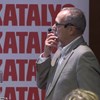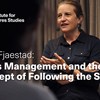mist
Law or fist? An interview on the Social Democrats and political resistance
How do you organize political resistance? Is it reasonable to use non-democratic methods to protect a democratic society? And how do you get everyone in a large organization to agree on a common strat
Maria Ojala: Hope in the face of climate change. Wishful thinking or an existential must?
Maria Ojala is Associate Professor (docent) in psychology at Örebro University. Her research interest mainly concerns how young people think, feel, act, cope, learn and communicate about climate chang
Digital fist bumps: searching for datafication and digitalisation in everyday CrossFit coaching practice
Frontiers in Sports and Active Living Abstract The research presented here explores the nuances of data collection and sharing via digital platforms in everyday CrossFit coaching practice. There is a gr
“Most MPs are Not All that Sharp.” Political Employees and Representative Democracy
International Journal of Public Administration, Vol 40 (7), s 548-558 (2017) DOI: http://dx.doi.org/10.1080/01900692.2016.1157693 Abstract The article analyses the orientations of political employees in
"Most MPs are not all that sharp." Political employees and representative democracy
Working Paper 2016 no. 2(Published in International Journal of Public Administration, Vol 40 (7), pp 548-558 (2017) DOI: http://dx.doi.org/10.1080/01900692.2016.1157693) This paper analyses the orient
Safety requirements vs. crashing ethically: what matters most for policies on autonomous vehicles
AI & Society, https://doi.org/10.1007/s00146-020-00964-6 Abstract The philosophical–ethical literature and the public debate on autonomous vehicles have been obsessed with ethical issues related to c
Lukas H. Meyer: Fairness is most relevant for country shares of the remaining carbon budget
Lukas H. Meyer, Professor of Philosophy at the University of Graz, Austria, and Speaker of the Field of Excellence Climate Change Graz, the Doctoral Programme Climate Change, and the Working Unit MoraIn my talk I argue that fairness concerns are decisive for eventual cumulative emission allocations shown in terms of quantified national shares.I will show that major fairness concerns are quantitatively critical for the allocation of the global carbon budget across countries. The budget is limited by the aim of staying well below 2°C. Minimal fairness requirements include securing basic needs, attributing historical responsibility for past emissions, accounting for benefits from past emissions, and not exceeding countries’ societally feasible emission reduction rate. The argument in favor of taking into account these fairness concerns reflects a critique of both simple equality and staged approaches, the former demanding the equal-per-capita distribution from now on, the latter preserving the inequality of the status-quo levels of emissions for the transformation period. I argue that the overall most plausible approach is a four-fold qualified version of the equal-per-capita view that incorporates the legitimate reasons for grandfathering.

The new inequality and the redistributive politics that disappeared
Professor Keith Banting har studerat den nya ojämlikheten i Kanada – framförallt dess politiska inramning och vilken betydelse den har för fördelningspolitiken. Han lyfter tre förståelser av den växan

Maja Fjaestad: Crises management and the concept of “following science”
Maja Fjaestad was state secretary for health in Sweden during the Covid 19 pandemic. Recently she published the book (with Emma Lennartsson) “Mitt i krisen” (In the Midst of the Crisis) (Volante, 2024

Research seminar with Maja Fjaestad: Post-pandemic reflections on leadership and preparedness: Crises management and the concept of “following science”
Venue: Institutet för framtidsstudier, Holländargatan 13, 4th floor, Stockholm, or online.Research seminar with Maja Fjaestad, IFFS researcher, expert coordinator at the Center for Health Crises at KI








